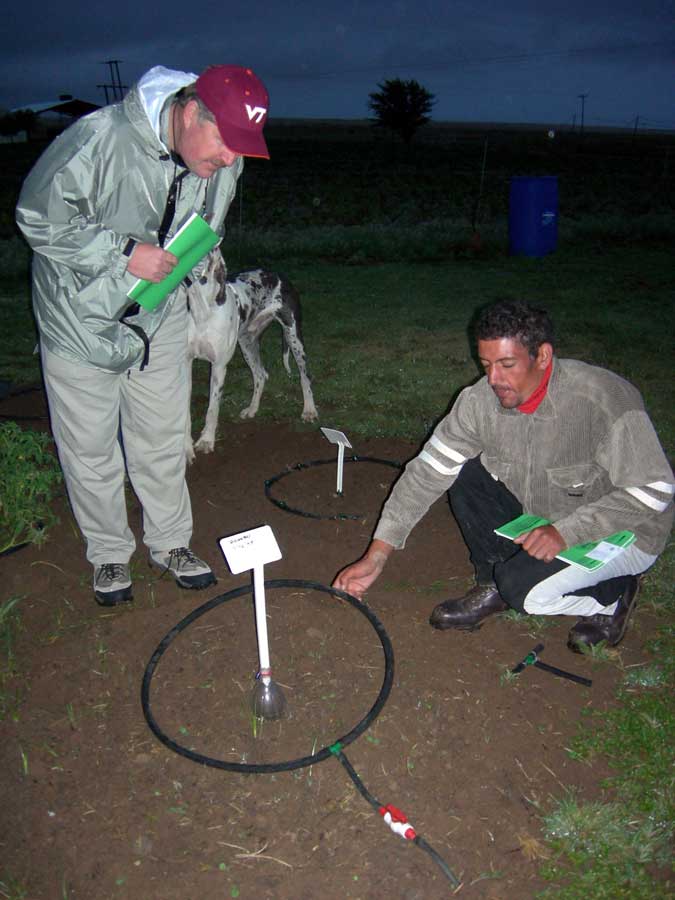Five researchers blog during trip to study plant disease management in South Africa

Three Virginia Cooperative Extension agents and two faculty members in Virginia Tech's College of Agriculture and Life Sciences are blogging about their experiences during a 17-day trek across South Africa.
The blog, Spanning the Globe: Virginia Cooperative Extension in South Africa, is a public, Web-based journal of their experiences.
The five globetrotters, who are studying disease management practices for agronomic crops, hope their journey to farms and research centers throughout South Africa will help them teach Virginia farmers how to fight plant diseases.
The three agents are Matthew Lewis of Northumberland County, David Moore of Middlesex County, and Robyn Whittington of Amelia County. The two faculty members in the Department of Plant Pathology, Physiology, and Weed Sciences are plant pathology instructor Mary Ann Hansen and plant pathology professor Erik Stromberg.
“We are especially interested in learning how South African farmers manage the potentially devastating disease Asian soybean rust, which was found for the first time on Virginia soybeans in the fall of last year,” said Hansen, who will lead the trip and who also manages the Plant Disease Clinic, a service laboratory that identifies plant diseases for Virginia Cooperative Extension agents. “South Africans have been dealing with this disease since 2001, when it first entered their country. We will also observe and learn about disease management in small grains and ‘maize,’ the South African term for corn.”
Hansen and her team left the United States on March 1. After they return on Saturday, March 17, the three agents participating in this year’s trip will share their knowledge with other agents in the Virginia Cooperative Extension system. This program debunks the myth that international exchange programs of this nature are one-sided and do not benefit U.S. agriculture.
“My whole life I have heard people say that the U.S. has given away its agricultural technology to foreign countries who have nothing to give in return,” Lewis said last month while preparing for the trip. “But from what I can gather, South Africa has much knowledge to share in terms of production technology, pest management, and rural policy. I am really looking forward to learning about their successes and using that knowledge to benefit Virginia agriculture.”
Virginia Tech’s agricultural exchange in South Africa began in 1997. That year, the College of Agriculture and Life Sciences, partnered with the University of the Free State in Bloemfontein, South Africa, to provide an international experience to students and faculty members from both Blacksburg and Bloemfontein. More than 80 students from the two universities have participated in the program to date.
In 2005, the U.S. Department of Agriculture funded “Development of an International Center in South Africa for Studies in Agriculture and Related Life Sciences,” a program to boost the relationship between Virginia Tech and the University of the Free State and expand the opportunities for collaborative research, teaching, outreach, and student exchange activities in South Africa. Hansen is one of the co-authors of the grant application. Richard Fell, professor of entomology at Virginia Tech, is the principal investigator. In addition to an effort to revitalize the student exchange, the grant funds the internship and training program that makes it possible for Virginia Cooperative Extension agents to travel to South Africa. The grant aims to enhance the capabilities of the agents and provide a transfer of knowledge back to Virginia farmers.
This is the second year that Virginia Cooperative Extension agents have had the opportunity to observe management practices on South African farms. Jim McKenna, a professor of crop and soil environmental science at Virginia Tech, led last year’s trip, which focused on small ruminant animals and dry-land pasture management. McKenna and his colleagues stayed in Bloemfontein, one of South Africa’s three capital cities, at night and traveled to rural South African farms during the day. Unlike them, Hansen and her team will begin their journey in the city and then travel from one location to the next, not returning to Bloemfontein until the end of their travels. Although finding an Internet hookup may be difficult at times, Hansen hopes the team will be able to blog about their experiences as often as possible.
About the College of Agriculture and Life Sciences
Nationally ranked among the top research institutions of its kind, Virginia Tech’s College of Agriculture and Life Sciences focuses on the science and business of living systems through learning, discovery, and engagement. The college’s comprehensive curriculum gives more than 2,200 students in a dozen academic departments a balanced education that ranges from food and fiber production to economics to human health. Students learn from the world’s leading agricultural scientists, who bring the latest science and technology into the classroom.
About Virginia Cooperative Extension
Virginia Cooperative Extension brings the resources of Virginia’s land-grant universities, Virginia Tech and Virginia State University, to the people of the commonwealth. Through a system of on-campus specialists and locally based agents, it delivers education in the areas of agriculture and natural resources, family and consumer sciences, community viability, and 4-H youth development. With a network of faculty at two universities, 107 county and city offices, 13 agricultural research and Extension centers, and six 4-H educational centers, Virginia Cooperative Extension provides solutions to the problems facing Virginians today.




